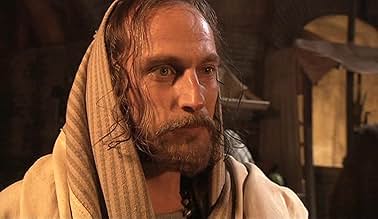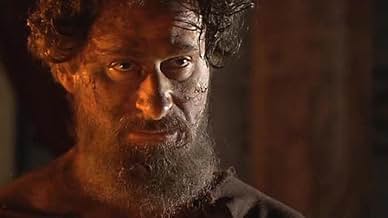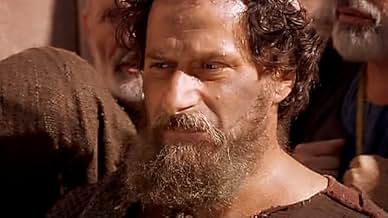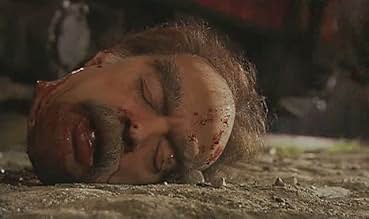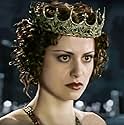Master i Margarita
- TV Series
- 2005
- 50m
IMDb RATING
7.5/10
5.2K
YOUR RATING
The devil and his attendants visit Moscow at the times of the Stalin regime. Official atheistic ideology confronts with a series of supernatural events.The devil and his attendants visit Moscow at the times of the Stalin regime. Official atheistic ideology confronts with a series of supernatural events.The devil and his attendants visit Moscow at the times of the Stalin regime. Official atheistic ideology confronts with a series of supernatural events.
- Awards
- 3 nominations total
Browse episodes
Featured reviews
I have read M&M probably 10 times, the Michael Glenny English translation (the others are worthless). This series is a great effort to visualise Bulgakov's grand novel. It is immediately apparent that a series of short films is the best format, so good on the funders and producers for getting that right. Most scenes are just how I pictured them, which really says something for Bulgakov's powers of communication.
I really liked the cast. Initially I was very surprised at the 'old' Pilate (Kirill Lavrov - at 80!), but after 5 minutes of being mesmerised, I realised he must be one of Russia's greats (and indeed he is). Although his age is technically unrealistic for a Roman procurator of Judea, it is a masterclass in acting. Woland (Oleg Basilashvili) is a towering presence, just the right combination of menace and pathos. Kovalchuk certainly looks the part as Margarita - and I am not sure that she could have played her much differently: it is a difficult character to understand from the book, one whose actions but not thoughts are externalised.
Great music. Decent enough special effects & animatronics to cover the magic bits (some younger people will complain about them, but you are forgetting that good actors in a real theatre can make you believe anything, and there the sets are just painted wood). Overall the pace feels right. I think its an excellent overall effort.
Any true M&M fans will appreciate this work, and I am sure find it easy to ignore the small flaws.
I really liked the cast. Initially I was very surprised at the 'old' Pilate (Kirill Lavrov - at 80!), but after 5 minutes of being mesmerised, I realised he must be one of Russia's greats (and indeed he is). Although his age is technically unrealistic for a Roman procurator of Judea, it is a masterclass in acting. Woland (Oleg Basilashvili) is a towering presence, just the right combination of menace and pathos. Kovalchuk certainly looks the part as Margarita - and I am not sure that she could have played her much differently: it is a difficult character to understand from the book, one whose actions but not thoughts are externalised.
Great music. Decent enough special effects & animatronics to cover the magic bits (some younger people will complain about them, but you are forgetting that good actors in a real theatre can make you believe anything, and there the sets are just painted wood). Overall the pace feels right. I think its an excellent overall effort.
Any true M&M fans will appreciate this work, and I am sure find it easy to ignore the small flaws.
This TV-series of 10 episodes, broadcast at the end of 2005 on the Russian Telekanal Rossiia, scored unprecedented ratings.
It was the second attempt of director Vladimir Bortko to film Bulgakov's masterpiece. In 2000 he had already been solicited by the Kino-Most film studio, associated with the competing channel NTV, but at the last moment the company did not succeed to come to an agreement with Sergei Shilovsky, grandson of Bulgakov's third wife, and owner of the copyrights. This time, with Rossiia, it worked. And it did not pass unnoticed.
This TV-epopee of more than 8 hours was heavily criticized, or at least regarded with much skepticism, before it was shown on screen. Sometimes it was sincere and well-grounded concern about the authenticity, but sometimes it seemed as if the Bulgakov die-hards behaved like modern Latunsky's by reproaching a movie they hadn't seen yet with sacrilege. Or maybe it was because of the gigantic publicity campaign that was launched to promote the series, and that could give reasons to fear an ambitious, but superficial Hollywood-ish production. But fortunately it wasn't the case.
In contrast with the earlier screen adaptation of Aleksandar Petrovic in 1972, director Vladimire Bortko (° Moscow, 1946) followed the book meticulously. If you have 10 times 52 minutes available for it, it is of course, easier than when you're supposed to deliver a 90 minutes movie picture. The setting of a TV-series appeared to be an ideal format to elaborate the complicated, multidimensional work with many different characters. Bortko had already shown his talent with his TV-adaptation of Fyodor Dostoevsky's The Idiot in 2003. Besides, he already filmed another novel of Bulgakov before: "Heart of a Dog", in 1988. He followed the dialogues almost word for word because, so he said, Bulgakov wrote the novel almost like a screenplay.
Ik was skeptical too when I saw the DVD at дом книги (Dom Knigi or "House of Books") in Moscow. But curiosity was stronger than skepticism and, frankly speaking, I was pleasantly surprised from the first images. Woland's meeting with Ivan and Berlioz, and the first confrontation of Pilate and Yeshua Ha-Notsri are not only beautifully portrayed and well performed, but in addition they matched remarkably well with the images that I had in mind when I first read the book.
The three layers of the novel are reflected more than well, with a well manipulated alternation of colour and black-and-white. The actors are casted accurately and they play the characters faithfully to the novel's intentions that even the most convinced skeptics shut their mouths, despite the huge success on December 29, 2005 more than 80 million people were watching.
Must I find demerits? Well... maybe the depiction of Behemoth then. With the existing technologies it could have been done better, but after all I can only conclude that, even though it is "only" TV, this series doesn't disenchant and its main merit is probably the the fact that Bulgakov now found a much bigger audience than he ever could have had with his books.
It was the second attempt of director Vladimir Bortko to film Bulgakov's masterpiece. In 2000 he had already been solicited by the Kino-Most film studio, associated with the competing channel NTV, but at the last moment the company did not succeed to come to an agreement with Sergei Shilovsky, grandson of Bulgakov's third wife, and owner of the copyrights. This time, with Rossiia, it worked. And it did not pass unnoticed.
This TV-epopee of more than 8 hours was heavily criticized, or at least regarded with much skepticism, before it was shown on screen. Sometimes it was sincere and well-grounded concern about the authenticity, but sometimes it seemed as if the Bulgakov die-hards behaved like modern Latunsky's by reproaching a movie they hadn't seen yet with sacrilege. Or maybe it was because of the gigantic publicity campaign that was launched to promote the series, and that could give reasons to fear an ambitious, but superficial Hollywood-ish production. But fortunately it wasn't the case.
In contrast with the earlier screen adaptation of Aleksandar Petrovic in 1972, director Vladimire Bortko (° Moscow, 1946) followed the book meticulously. If you have 10 times 52 minutes available for it, it is of course, easier than when you're supposed to deliver a 90 minutes movie picture. The setting of a TV-series appeared to be an ideal format to elaborate the complicated, multidimensional work with many different characters. Bortko had already shown his talent with his TV-adaptation of Fyodor Dostoevsky's The Idiot in 2003. Besides, he already filmed another novel of Bulgakov before: "Heart of a Dog", in 1988. He followed the dialogues almost word for word because, so he said, Bulgakov wrote the novel almost like a screenplay.
Ik was skeptical too when I saw the DVD at дом книги (Dom Knigi or "House of Books") in Moscow. But curiosity was stronger than skepticism and, frankly speaking, I was pleasantly surprised from the first images. Woland's meeting with Ivan and Berlioz, and the first confrontation of Pilate and Yeshua Ha-Notsri are not only beautifully portrayed and well performed, but in addition they matched remarkably well with the images that I had in mind when I first read the book.
The three layers of the novel are reflected more than well, with a well manipulated alternation of colour and black-and-white. The actors are casted accurately and they play the characters faithfully to the novel's intentions that even the most convinced skeptics shut their mouths, despite the huge success on December 29, 2005 more than 80 million people were watching.
Must I find demerits? Well... maybe the depiction of Behemoth then. With the existing technologies it could have been done better, but after all I can only conclude that, even though it is "only" TV, this series doesn't disenchant and its main merit is probably the the fact that Bulgakov now found a much bigger audience than he ever could have had with his books.
OK i read this book and was curious to see the movie to see what they would.
I had seen many Russian series before this and was generally unimpressed as i think they spent all the money on the cars and not anything else.
Furthermore Goblin and a few other reviewers and critics i read were generally so so on it.
So i was incredibly surprised to find how well they pulled this off. Its not an issue of "accuracy" (even though an acquaintances mother who is a teacher of literature in Russia and read this 20 times cover to cover was very satisfied) it is an issue of originality. The black and white to color switches, the acting, the actors, the music i found it really well done as well it should be since it is so well loved in Russia.
Really they put in the effort and i was generally pleased with the result. Again not due to "accuracy" or inaccuracy, as that is impossible to do with certain films but with the originality and what i thought was quality film making.
Btw, when Kot Begemot turned into the guy who plays Stira in ShtrafBat, my jaw dropped seeing as that was the person with the "cat eyes" who i pictured when i read Master and Bulgakov described him.
10 stars is an understatement.
I had seen many Russian series before this and was generally unimpressed as i think they spent all the money on the cars and not anything else.
Furthermore Goblin and a few other reviewers and critics i read were generally so so on it.
So i was incredibly surprised to find how well they pulled this off. Its not an issue of "accuracy" (even though an acquaintances mother who is a teacher of literature in Russia and read this 20 times cover to cover was very satisfied) it is an issue of originality. The black and white to color switches, the acting, the actors, the music i found it really well done as well it should be since it is so well loved in Russia.
Really they put in the effort and i was generally pleased with the result. Again not due to "accuracy" or inaccuracy, as that is impossible to do with certain films but with the originality and what i thought was quality film making.
Btw, when Kot Begemot turned into the guy who plays Stira in ShtrafBat, my jaw dropped seeing as that was the person with the "cat eyes" who i pictured when i read Master and Bulgakov described him.
10 stars is an understatement.
"Master and Margareth" has always been my favorite book. I have read a lot of books, and none of them had captivated and haunted me in such a way that I would read it again and again and again. It is one of the most unusual and mysterious books ever written in the 20th century. And, finally, there is a movie which is as close to the original as possible. To be honest, there is a lot of really bad movies made in Russia, and most of them are so dreadful that it should be made illegal to pocess them! "Master and Margareth" is a pleasant and distinguished exemption from the endless flood of utterly horrible junk which is called Russian film-making. I really loved the movie. The actors are great, digital photography and the special effects aren't so bad either. Of course, it could have always been better but Russian films never have the same budget as an average Hollywood flick. I enjoyed the way the movie turns from B&W to color and opposite. And the soundtrack is amazing. They should release it separately on a CD.
This long awaited version does not mean that you don't need to read the book. No matter how perfect the adaptation is (it is far above excellent in this case), it can never replace the original. If you've never read it, do yourself a favor and do it as soon as possible. If you had read it before, it is really worth giving it another go. If you do it once every 5-10 years, you will definitely find something new in it.
Finally, it has been released with English subtitles. It would not be really fair to all English speaking scholars, researchers and Bulgakov's lovers who otherwise wouldn't have been able to watch this masterpiece.
This long awaited version does not mean that you don't need to read the book. No matter how perfect the adaptation is (it is far above excellent in this case), it can never replace the original. If you've never read it, do yourself a favor and do it as soon as possible. If you had read it before, it is really worth giving it another go. If you do it once every 5-10 years, you will definitely find something new in it.
Finally, it has been released with English subtitles. It would not be really fair to all English speaking scholars, researchers and Bulgakov's lovers who otherwise wouldn't have been able to watch this masterpiece.
"Master and Margarita", the book and the movie:
I have read "Master and Margarita" three times, and I am sure that I will read it again. I was very lucky because all three times I read it in Russian, and even the best translation can not compare to the original. Every time, I found something new in the book; it would turn to me by different facets. "Master and Margarita" is incredibly beautiful, deep, sophisticated yet playful and sparkling book with unforgettable characters. In fact, it is not one novel but three. First, about the adventures of the Devil and his company in 1920's Moscow; second, about Pontius Pilatus and Jesus in Jerusalem of the first century, and the third one, about the Master, the writer who wrote the second novel, and his eternal and true love, Margarita. The story of Master and Margarita is the story of Bulgakov and his wife and muse, Elena. All three stories are interconnected and intertwined. All three end with the exactly same phrase, "...the cruel fifth procurator of Judea, the equestrian Pontius Pilatus."
So, what is the book about? Good, evil, betrayal, talent, love, forgiveness? Yes, it is. But it is so much more.
I had a lot of doubts before watching the film because as much as I wanted to see "Master and Margarita" on screen I was not sure that it was possible to adapt it and not to lose anything significant - which is everything.
I am pleasantly surprised - the film is very good. It is respectful, thoughtful and as close to the spirit of the greatest Russian novel of the last century as possible.
The movie is not perfect (and I don't think that the perfect transfer is possible) but the choice of actors, the music score, the visual palette that change as we enter the different eras, places, and dimensions are outstanding. I was initially surprised by some names but almost every actor proved him/herself very capable in bringing to the screen well known and beloved characters. I would say that some of special effects could be ...well, more special - for example, the mischievous talking cat Behemoth could be done more interestingly. I also don't see the exact reason for creating a new character, the man in uniform with the glasses and very recognizable accent who is in charge of investigating the "crimes of the band of powerful hypnotists" - how they call Woland and his entourage. One can argue that the titular couple, the tragic lovers, Master and Margarita are weaker and their story seems pale in the comparison to one of Pilatus
(bravo to 80 year old stage and screen legend, Kirill Lavrov who can be remembered as Ivan Karamazov in The Brothers Karamazov (1969) and Ieshua Ha-Notsri (incredible performance by the young bright star, Sergei Bezrukov of "Brigada"'s fame, almost unrecognizable as Ieshua). I think no one can deny that Oleg Basilashvili as powerful, cynical and eternally wise Woland, the part of Power " Which wills forever evil Yet does forever good" IS the true Master of the series. My fascination and admiration belong to Alexander Abdulov on whom I as a young girl had a huge crush in his early film "Obyknovennoye Chudo" . For many years he had been the Russian sex symbol but his enormous comical talent found its match in the part of Woland's assistant/ translator, Koroviev. His and Behemoth's adventures in Moscow are screamingly funny. I think that the film is a successful and enjoyable adaptation of the beloved cult novel and I recommend seeing it. I am going to order the sound track. As I mentioned, the music by Igor Kornelyuk is one of the film's treasures.
P.S. I used to work on the street where the last home of Mikhail Bulgakov was. He was taken to the cemetery from there.
The famous "Pashkov's House" with the rotunda on the top where Woland and his team gathered together before they left Moscow forever, was in walking distance from my work, and I remember, once, I almost got hit by a car -I walked and looked at that music in stone and could not take my eyes off it.
I have read "Master and Margarita" three times, and I am sure that I will read it again. I was very lucky because all three times I read it in Russian, and even the best translation can not compare to the original. Every time, I found something new in the book; it would turn to me by different facets. "Master and Margarita" is incredibly beautiful, deep, sophisticated yet playful and sparkling book with unforgettable characters. In fact, it is not one novel but three. First, about the adventures of the Devil and his company in 1920's Moscow; second, about Pontius Pilatus and Jesus in Jerusalem of the first century, and the third one, about the Master, the writer who wrote the second novel, and his eternal and true love, Margarita. The story of Master and Margarita is the story of Bulgakov and his wife and muse, Elena. All three stories are interconnected and intertwined. All three end with the exactly same phrase, "...the cruel fifth procurator of Judea, the equestrian Pontius Pilatus."
So, what is the book about? Good, evil, betrayal, talent, love, forgiveness? Yes, it is. But it is so much more.
I had a lot of doubts before watching the film because as much as I wanted to see "Master and Margarita" on screen I was not sure that it was possible to adapt it and not to lose anything significant - which is everything.
I am pleasantly surprised - the film is very good. It is respectful, thoughtful and as close to the spirit of the greatest Russian novel of the last century as possible.
The movie is not perfect (and I don't think that the perfect transfer is possible) but the choice of actors, the music score, the visual palette that change as we enter the different eras, places, and dimensions are outstanding. I was initially surprised by some names but almost every actor proved him/herself very capable in bringing to the screen well known and beloved characters. I would say that some of special effects could be ...well, more special - for example, the mischievous talking cat Behemoth could be done more interestingly. I also don't see the exact reason for creating a new character, the man in uniform with the glasses and very recognizable accent who is in charge of investigating the "crimes of the band of powerful hypnotists" - how they call Woland and his entourage. One can argue that the titular couple, the tragic lovers, Master and Margarita are weaker and their story seems pale in the comparison to one of Pilatus
(bravo to 80 year old stage and screen legend, Kirill Lavrov who can be remembered as Ivan Karamazov in The Brothers Karamazov (1969) and Ieshua Ha-Notsri (incredible performance by the young bright star, Sergei Bezrukov of "Brigada"'s fame, almost unrecognizable as Ieshua). I think no one can deny that Oleg Basilashvili as powerful, cynical and eternally wise Woland, the part of Power " Which wills forever evil Yet does forever good" IS the true Master of the series. My fascination and admiration belong to Alexander Abdulov on whom I as a young girl had a huge crush in his early film "Obyknovennoye Chudo" . For many years he had been the Russian sex symbol but his enormous comical talent found its match in the part of Woland's assistant/ translator, Koroviev. His and Behemoth's adventures in Moscow are screamingly funny. I think that the film is a successful and enjoyable adaptation of the beloved cult novel and I recommend seeing it. I am going to order the sound track. As I mentioned, the music by Igor Kornelyuk is one of the film's treasures.
P.S. I used to work on the street where the last home of Mikhail Bulgakov was. He was taken to the cemetery from there.
The famous "Pashkov's House" with the rotunda on the top where Woland and his team gathered together before they left Moscow forever, was in walking distance from my work, and I remember, once, I almost got hit by a car -I walked and looked at that music in stone and could not take my eyes off it.
Did you know
- TriviaThe film contains 163 minutes of special computer generated effects.
- ConnectionsFeatured in Legendy mirovogo kino: Kirill Lavrov
Details
- Release date
- Country of origin
- Official site
- Language
- Also known as
- The Master and Margarita
- Filming locations
- Production companies
- See more company credits at IMDbPro
- Runtime
- 50m
- Color
- Sound mix
Contribute to this page
Suggest an edit or add missing content

